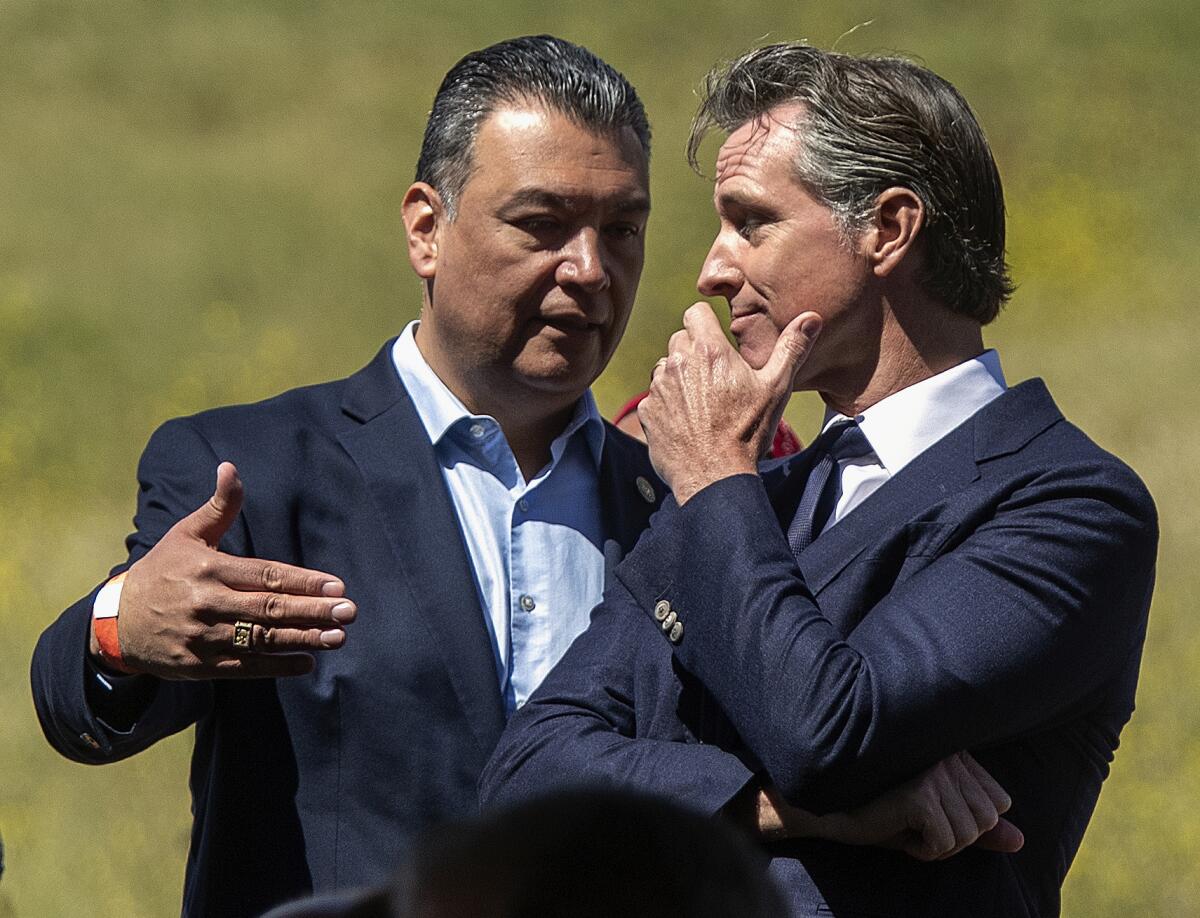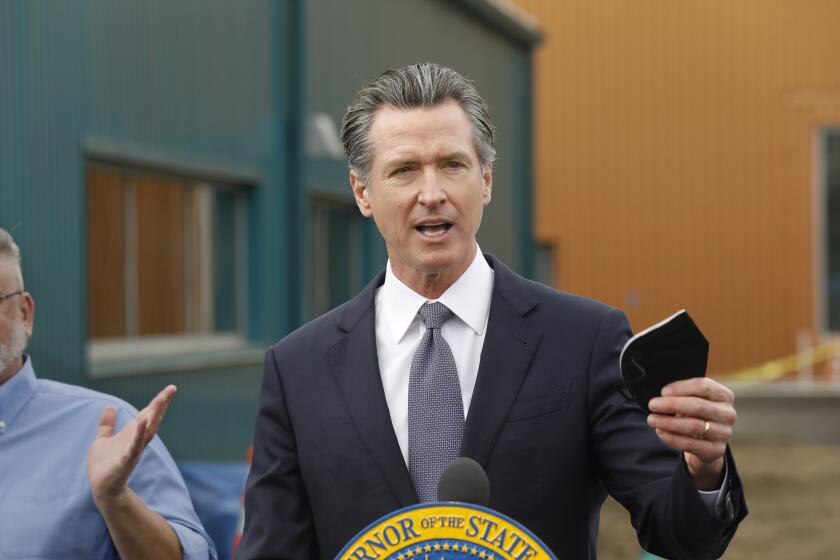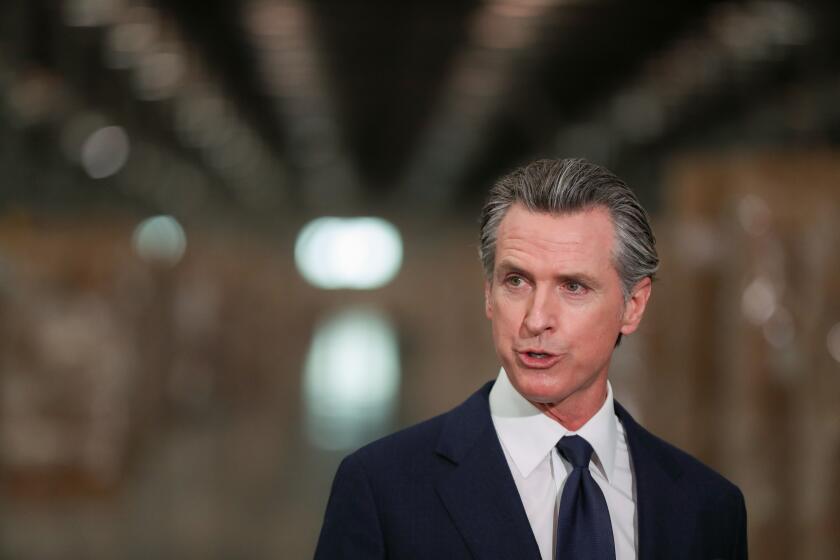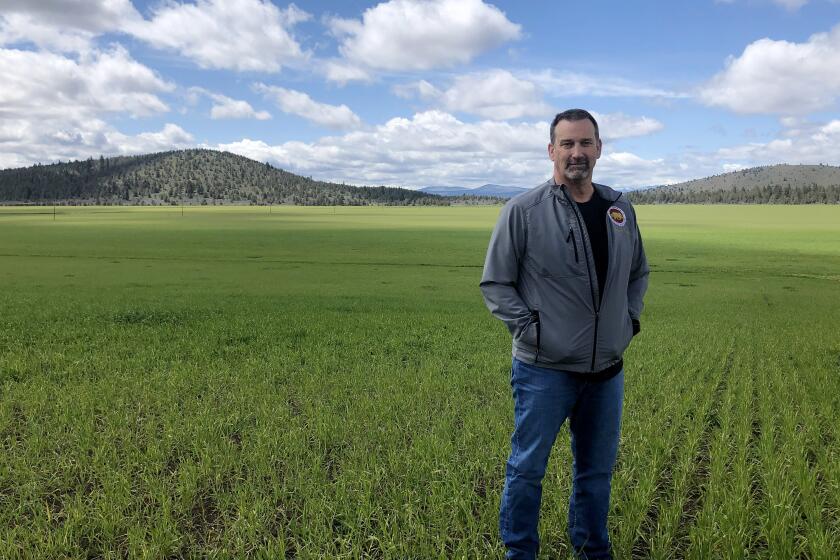With a triumphant primary win, Newsom eyes the road ahead

- Share via
Gov. Gavin Newsom appeared as unconcerned with the primary election Tuesday as most Californians.
The Democrat dropped off his ballot in the morning in Sacramento without any news cameras. He made no campaign stops, held no election night party. Twenty minutes after the polls closed, he was declared the winner and his subsequent social media posts didn’t mention the race or his eventual opponent.
“Across the country, Republicans are attacking our fundamental rights as Americans. Destroying democracy, stripping a woman of the right to choose, and standing idly by as gun violence claims far too many lives,” Newsom said. California is “the antidote — leading with compassion, common sense and science. Here’s to continuing that fight.”
Tucked inside the statement was Newsom’s strategy for what comes next. With little chance of losing in November and unencumbered by typical reelection politics, he is poised to instead focus on continuing to insert the state into the national debate over reproductive rights and gun control, issues that matter deeply to Californians and could boost his political profile beyond the state‘s borders.
Gov. Gavin Newsom’s showing in California’s primary shows how formidable he is even after the COVID-19 pandemic, devastating wildfires and worsening homelessness.
“It’s just sitting there in his lap, whether he wants it or not,” said Darry Sragow, a veteran Democratic strategist and publisher of the nonpartisan California Target Book. “There is this opportunity for him to attempt to help shape the national dialogue on these social issues. The question is how visible he wants to be and how assertive he wants to be in increasing his visibility.”
On Tuesday, Newsom bested the second-place finisher in the gubernatorial primary, state Sen. Brian Dahle, by nearly 40 points. Dahle, a Republican from Bieber, won much of his own district abutting the Oregon and Nevada borders in the northeastern corner of the state while Newsom took the rest of California.
The results suggest little has changed on the political landscape for Newsom since he beat the recall last year, earning the support of 61% of voters to keep his job in spite of the COVID-19 pandemic, wildfires, the drought and a cascade of other problems.
“It was a resounding backing from the electorate and for anyone who comes out of a recall like that, it only fortifies and makes you more resolute to continue down the path,” said Juan Rodriguez, Newsom’s campaign manager.
This time, Newsom is expected to rely on the same playbook he used in the recall election — casting the vote as a choice between the state’s progressive ideals and those championed by supporters of former President Trump.
Dahle’s lower name recognition, a major fundraising disadvantage and his GOP affiliation make his chances of winning in November a long shot. A potential U.S. Supreme Court ruling on abortion rights and the debate over gun control give Newsom another contrast between himself and a Republican opponent.
“I think we’re all predicting that once that ruling comes out that it becomes something Democrats across the country use to motivate the base,” Rodriguez said. “It’s an awakening for Democrats that democracy is on the ballot in November.”
Newsom and legislative leaders are seeking to make abortion rights more than a symbolic issue in the fall. Newsom has embraced legislative plans to place a measure on the November ballot asking voters to enshrine the right to abortions and contraceptives in the California Constitution.
California’s Constitution includes broad rights of privacy but has no explicit protection for abortion services.
Doing so could apply pressure on Republicans vying for hotly contested congressional seats and other down-ballot offices to take a stance on abortion rights in a state where more than three-quarters of likely voters oppose overturning Roe vs. Wade. The amendment gives Newsom, who has called abortion rights “the defining issue of the 2022 election,” a chance to affect congressional races and define himself as a champion for reproductive rights.
On Thursday, Newsom shared a stage with the Canadian Prime Minister Justin Trudeau to talk about their cooperation on climate change at the Summit of the Americas in Los Angeles. Trudeau said that “Canadians are impressed with Gov. Newsom” at a time of political uncertainty around the world and in the United States. Newsom thanked the Canadian government for supporting California during its battle with the Trump administration over vehicle emissions and praised Trudeau for his work on gun safety.
“You contrast that to the lack of leadership, the cowards that continue to dominate the national debate as it relates to gun safety policy,” Newsom said.
Newsom’s uncompetitive race gives him the freedom to fight for California’s more progressive ideals but also occasionally disagree with liberal groups on other controversial issues and risk little electoral backlash.
Though Newsom and his advisors have been careful to suggest the ambitious homelessness plan he unveiled in March stops short of a more conservative approach to force those with substance abuse and psychotic disorders into treatment, the proposal has drawn criticism from civil and disability rights groups that argue it would do just that while criminalizing poverty and homelessness.
Sragow called Newsom’s proposal “spot on” with voters in the state who want to see people who could be a danger to themselves or others get help. He said it could also help Newsom prove later on that he’s not as wildly liberal as voters from other places view him.
“It’s an opportunity for him to paint himself as someone who would be acceptable, maybe as a president, or certainly on the national stage, to a lot of voters who live somewhere between California and New York,” Sragow said.
While those close to Newsom said he sees value in defining a national agenda and helping shape the Democratic party, he’s repeatedly denied having White House aspirations.
Dahle said Newsom should give less attention to national issues that won’t affect Californians and instead answer to the problems that have gotten worse under his watch: homelessness, crime and the rising cost of gas.
“This is a tough race,” Republican state Sen. Brian Dahle said about his decision to challenge Democratic Gov. Gavin Newsom.
“He’s running for president, and everybody knows it,” Dahle said. “He just doesn’t say it. If he was focused on California, he wouldn’t be talking about what’s happening in other states. He would be focused on what’s happening in California.”
Though positioned well as a national Democratic leader, California governors rarely find a path to the presidency. Newsom would also have to be careful to avoid past mistakes, such as his visit to a posh Napa Valley restaurant during the pandemic‘s first year that muddied his reputation.
He could also have a tough time overcoming the persona that defines him in the minds of many voters across the nation. During his first year as governor, Newsom placed a moratorium on death row executions. Before that, he fought to legalize marijuana. Newsom also has been an outspoken champion of LGBTQ rights.
“Even if he tries to move more towards the center, his record is there and it’s very liberal,” said Cal State Fullerton political scientist Sarah Hill.
Newsom’s advisors hope the primary is viewed as a key moment in his political legacy.
He appointed Sen. Alex Padilla as California’s first Latino U.S. senator in 2020 and filled Padilla’s former job with Secretary of State Shirley Weber, the first Black woman to hold the position. Months later, he named the first Filipino attorney general, Rob Bonta.
All three breezed through their first test with voters, earning more than 50% of the vote in each of their respective primary elections.
“He deserves a lot of credit for seizing those three opportunities to make major strides in the diversity of our community of elected officials who represent and speak for California,” Sragow said. “All three are in strong political positions and to the extent, given in the world of politics you’re always being measured as a winner or loser, he looks like a winner for making good choices and good decisions.”
Times staff writer Phil Willon contributed to this report.
More to Read
Sign up for Essential California
The most important California stories and recommendations in your inbox every morning.
You may occasionally receive promotional content from the Los Angeles Times.














